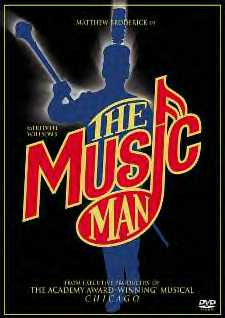Plot
In 1912, a con artist named Harold Hill arrives in River City, Iowa where he is greeted with sneers from its citizens. He meets up with his friend Marcellus Washburn, who warns him about the town librarian and moral watchdog, Marian Paroo. Hill asks Marcellus if there is any news in the city and Marcellus tells him that the town bought a pool table for the billiard hall. Hill takes advantage of this to warn parents that the pool table will bring havoc to their town.
Marian teaches a piano lesson to her student Amaryllis and argues with her mother about her stubbornness to get married. Marian's brother Winthrop is mocked by Amaryllis for having a lisp, though Amaryllis reveals to Marian that she has a crush on Winthrop. Marian and Amaryllis both vow to say goodnight to their "someones" until they find someone to love.
Later, during a town meeting, Hill steals the spotlight to advertise for his new boys' band in River City. After the meeting, Hill sends town hooligan Tommy Djilas on a date with Zaneeta Shinn, unaware that she is the mayor's daughter. When the town's school board asks for Hill's credentials, he distracts them by pointing out that they could be a singing quartet.
Hill reveals to Marcellus that, along with gathering money from the entire town, he plans to woo Marian. He visits the library and flirts with Marian, who shuts down all of his advances, though she secretly admires him. Hill, then, visits Mrs. Paroo and she signs Winthrop up to play cornet in the band.
The Wells Fargo Wagon arrives with the instruments, uniforms, and instruction booklets for the band. When Winthrop gets his cornet, Marian sees how happy he is and she destroys the evidence against Hill.
On the day of the Fourth of July picnic, anvil salesman Charlie Cowell arrives in River City to tell Mayor Shinn about Hill's lies but Marian distracts him by kissing him, causing him to miss his train. Marian realizes that Charlie's claims are most likely lies and agrees to meet Hill at the footbridge later that evening. Marian and Hill head to the bridge and she assures him that she will always love him, even if he leaves her to travel to another town. He leaves her to meet with Marcellus, who has collected the money for the uniforms and they make a plan to leave River City. Marian admits that she knew he was lying about his education and they depart happily, deeply in love with each other.
Mayor Shinn interrupts the picnic to let Charlie speak. He tells the citizens that they've been swindled by Hill and that he plans to leave the town. The crowd follows Shinn to track down Hill and Marcellus goes to Hill's hotel room to tell him to leave. Winthrop angrily tells Hill that he hates him, but Marian convinces him that Hill brought happiness to the town. Though the Paroos try to get Hill to leave, he admits that he can't leave Marian and he is captured. Hill is brought in to be tarred and feathered, but Tommy and Marcellus interrupt the meeting with a group of boys in band uniforms with instruments. Though they sound awful when they play, the parents are so proud of their children that they forget their anger and cheer the band on. Hill is set free and leads the crowd down the street in a parade, joined by Marian.
Critical reception
The film received mixed reviews. Most critics found it inferior to the original 1962 film version of the play, and Broderick's performance as Hill was generally compared unfavorably to Robert Preston's. Edward Guthmann of the San Francisco Chronicle called it "passable entertainment" with "strong production values, excellent costumes and art direction, and a rich color palette that conjures cozy notions of small-town America in the early 20th century," but he felt it "never matches the 1962 film with its classic performance by the late Robert Preston. It was Preston ... who galvanized The Music Man with his vibrant, masculine authority ... Broderick, by comparison, is cute, wide-eyed, a bit squishy and about as dynamic and intimidating as Winnie the Pooh. His singing is adequate, his dancing heavy and forced. ... Meron and Zadan, who also produced the successful TV version of Annie in 1999 and the excellent Life with Judy Garland: Me and My Shadows in 2001, have developed a winning formula for quality television movies with bigger-than-usual budgets. The Music Man, handsome but misbegotten, doesn't match their usual standard." [2]
Writing for The New York Times , Michele Willens noted, "In The Music Man, Ms. Chenoweth finally gets a television part worthy of her talent," and she called the dances choreographed by Kathleen Marshall "inventive." [3]
This page is based on this
Wikipedia article Text is available under the
CC BY-SA 4.0 license; additional terms may apply.
Images, videos and audio are available under their respective licenses.
